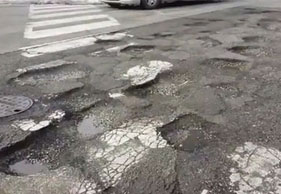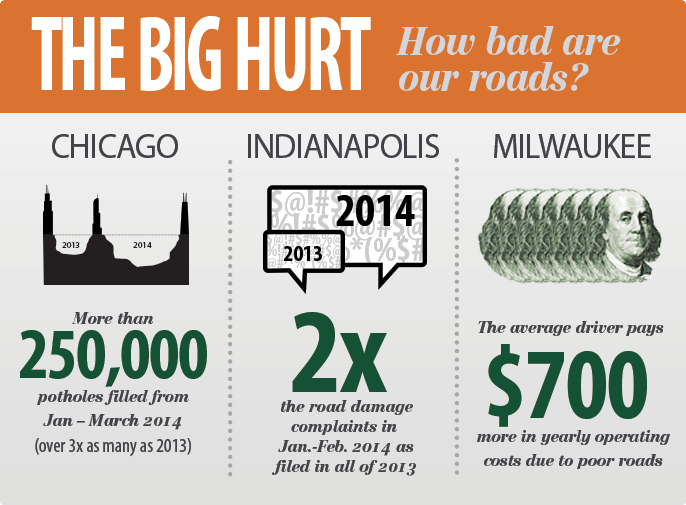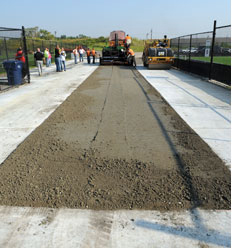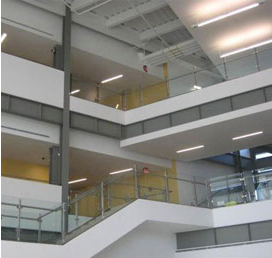Local roads got so bad this winter that Chicago’s Second City comedy troupe put out a mock commercial thanking Mayor Rahm Emanuel for keeping the auto repair shops humming.
But drivers who suffered tire, rim and suspension damage weren’t laughing. Nationwide, substandard road conditions cost drivers an estimated $80 billion in vehicle damage every year, Bloomberg News reports.
Cities are rushing to fix roads as spring arrives – even as their budgets slide into the red. “We’re throwing everything we can at it,” says Lori Miser, director of the Indianapolis Department of Public Works. By February Indy had already exceeded its winter road maintenance budget by $5 million.
“Our roads are in bad condition,” Milwaukee Department of Public Works Commissioner Ghassan Korban admits, echoing Miser’s concerns. In March the city hired 25 new full-time workers to tackle emergency repairs.
Private property owners aren’t immune, either – since parking lots and commercial lanes take the same beating as public roads. And with climate experts saying that extreme weather may be the new normal, it’s clear we need a different approach.
From maintenance to prevention

Prairie Material, along with leading paving contractors, is encouraging public and private decision-makers to consider concrete as part of the solution.
“Concrete is a cost-effective choice for states, municipalities and private owners who need to extend the life of paved surfaces,” says Prairie President Richard Olsen. “Greater durability means we prevent damage rather than scrambling to keep up with constant repairs. The added dividends will be greater public safety, long-term cost savings and far less disruption for motorists and businesses.”
Getting all the facts on the table
Accurate, complete comparisons reveal the long-term value of concrete, says Prairie Marketing Product Specialist Theron Tobolski.
“Recently we were called in to provide an alternate pavement design for a business owner who is building a new gas station where there will be heavy truck traffic,” he says. “First bids on the project showed that the concrete alternate would cost $190,000 more than asphalt, but we could see the asphalt wouldn’t perform well under the anticipated truck loads.”
The owners asked Prairie Material to provide an asphalt design that was structurally comparable to the concrete design. Working with Randall Riley, PE of the American Concrete Paving Association (ACPA), they rendered designs with equal structural integrity that would carry the same loads with the same profile depth. With structural integrity being equal, the cost difference between asphalt and concrete then dropped to $25,000 – a relatively small number given the superior longevity of concrete.
“The project’s still in the planning stages and anything can happen, but based on the owner’s positive response to our life-cycle cost analysis, we’re confident they’ll choose concrete,” Tobolski says.
Roads that last
Municipalities looking to prevent potholes are harnessing the strength of roller-compacted concrete (RCC) for road rebuilding. The Village of Streamwood, Illinois started its RCC program in 2008, Tobolski reports, adding that Des Plaines and Franklin Park have recently approved RCC as an alternate paving choice.
Whitetopping and full-depth concrete paving are gaining ground as asphalt costs continue their upward trend. “Ultra-thin whitetopping has a proven track record in our market and can provide 20 years of service,” Randall Riley notes. “Conventional whitetopping pavements of 4 inches or more have a proven service life of 40 years in our area.”
Redi-Pave™, our high-early-strength mix, is ideal for full-depth repairs to bridges, toll plazas, city streets and commercial lanes that must reopen to traffic in 1-3 days.
Tools to compare costs, benefits
Whatever size or type of paving job you’re looking at, the key is knowing how to do a sound life-cycle cost analysis (LCCA). ACPA and the National Ready Mixed Concrete Association (NRMCA) offer a full range of tools for your use.
ACPA’s robust StreetPave software helps you compare life-cycle costs of concrete and asphalt under a variety of roadway conditions and needs. The NRMCA’s Concrete Pavement Analyst (CPA) software, designed for parking lot applications, uses ACI and Asphalt Institute recommendations to compare total ownership costs.
Let’s lead together
Prairie’s sales and technical teams welcome your questions about all forms of concrete paving. We can help you create sound LCCA comparisons and respond to questions from government and private decision-makers.
Contact us for expert support on your next paving project.






 United Materials
United Materials Superior Materials
Superior Materials Prairie Materials
Prairie Materials Canada Building Materials
Canada Building Materials VC Global
VC Global